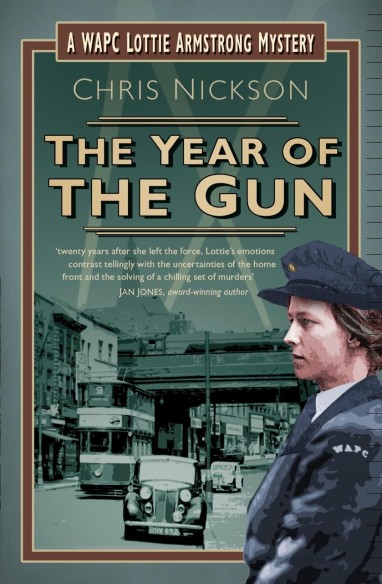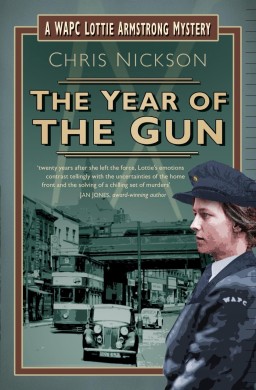
You all know how much I love an historical novel and I’m thrilled that today, thanks to lovely Leah Grant at The History Press, I am able to share an extract from The Year of the Gun by Chris Nickson with you. Not only that, if you live in the UK you can enter to win your own paperback copy of The Year of the Gun at the bottom of this blog post.
Published by The History Press on 1st September 2017, The Year of the Gun is available for purchase here.
The Year of the Gun

1944: Twenty years after WPC Lottie Armstrong was dismissed from the Leeds police force, she’s back, now a member of the Women’s Auxiliary Police Corps.
Detective Chief Superintendent McMillan is now head of CID, trying to keep order with a depleted force as many of the male officers have enlisted. This hasn’t stopped the criminals, however, and as the Second World War rages around them, can they stop a blackout killer with a taste for murder?
An Extract from The Year of the Gun
Why are there suddenly so many Americans around?’ Lottie asked as she parked the car on Albion Street.
‘You can hardly turn a corner without running into one.’
‘Are you sure that’s not just your driving?’ McMillan said. She glanced in the mirror, seeing him sitting comfortably in the middle of the back seat, grinning.
‘You could always walk, sir.’ She kept her voice perfectly polite, a calm, sweet smile on her face. ‘It might shift a few of those inches around your waist.’
He closed the buff folder on his lap and sighed. ‘What did I do to deserve this?’
‘As I recall, you came and requested that I join up and become your driver.’
‘A moment of madness.’ Detective Chief Superintendent McMillan grunted as he slid across the seat of the Humber and opened the door. ‘I shan’t be long.’
She turned off the engine, glanced at her reflection and smiled, straightening the dark blue cap on her head.
Three months back in uniform and it still felt strange to be a policewoman again after twenty years away from it. It was just the Women’s Auxiliary Police Corps, not a proper copper, but still… after they’d pitched her out on her ear it tasted delicious. Every morning when she put on her jacket she had to touch the WAPC shoulder flash to assure herself it wasn’t all a dream.
And it was perfectly true that McMillan had asked her. He’d turned up on her doorstep at the beginning of November, looking meek.
‘I need a driver, Lottie. Someone with a brain.’
‘That’s why they got rid of me before,’ she reminded him.
‘Too independent, you remember?’ McMillan had been a detective sergeant then: disobeying his order had put her before the disciplinary board, and she’d been dismissed from Leeds City Police. ‘Anyway, I’m past conscription age. Not by much,’ she added carefully, ‘but even so…’
‘Volunteer. I’ll arrange everything,’ he promised.
Hands on hips, she cocked her head and eyed him carefully.
‘Why?’ she asked suspiciously. ‘And why now?’
She’d never really blamed him for what happened before. Both of them had been in impossible positions. They’d stayed in touch after she was bounced off the force – Christmas cards, an occasional luncheon in town – and he’d been thoughtful after her husband Geoff died. But none of that explained this request.
‘Why now?’ he repeated. ‘Because I’ve just lost another driver. Pregnant. That’s the second one in two years.’
Lottie raised an eyebrow.
‘Oh, don’t be daft,’ he told her. He was in his middle fifties, mostly bald, growing fat, the dashing dark moustache now white and his cheeks turning to jowls. By rights he should have retired, but with so many away fighting for King and Country he’d agreed to stay on for the duration.
He was a senior officer, effectively running CID in Leeds, answerable to the assistant chief constable. Most of the detectives under him were older or medically unfit for service. Only two had invoked reserved occupation and stayed on the Home Front rather than put on a uniform.
But wartime hadn’t slowed down crime. Far from it. The black market had become worse in the last few months, gangs, deserters, prostitution. More of it than ever. Robberies were becoming violent, rackets more deadly. Criminals had guns and they were using them.
And now Leeds had American troops all over the place.
‘Back to Millgarth,’ McMillan said when he returned, balancing a brown paper bag carefully in one hand. ‘If nothing’s come up while we’ve been gone, you can call it a day and get off home.’ Good, Lottie thought. The Co-op might have some tea left; she was almost out. She didn’t hold out much hope for the butcher by this time of day, though. At least it had been a bountiful year in the garden: plenty of potatoes and carrots and a decent crop of peas and marrows. One thing about all this rationing, she hadn’t gained any weight since it started. If anything she’d lost a little; clothes she’d worn ten years before still fitted.
She followed McMillan into the station and up the rickety wooden staircase, gas mask case banging gently against her hip. Why she bothered with one, she didn’t know; most people had stopped carrying them. On the landing a poster read Coughs and Sneezes Spread Diseases, the words so faded they were almost invisible. His office was the second one along a corridor where the old linoleum curled at the edges and the paint flaked under the fingers.
‘Quiet for once,’ McMillan said as he inspected his desk.
‘Close the door.’
‘Sir?’
‘Chop chop.’
She did as he ordered, then watched him reach into the paper bag and draw out two eggs. Real, fresh eggs. When was the last time she’d seen any of those?
‘Go on, take them. They’re for you. When I saw Timmy
Houghton he gave me four. Or don’t you want them?’
Lottie scooped them up carefully, swaddled them in a hand- kerchief and placed them in her handbag.
‘Of course. Thank you.’ She didn’t know what to say. He had a habit of doing things like this. A little something here and there. A pair of stockings, some chocolate. Even a quarter- pound of best steak once that tasted like a feast. In the three months she’d been working for him she felt spoilt. It was his way of thanking her.
At the bus stop she cradled her bag close, miles away as she dreamed of the eggs, maybe with a sausage and some fried bread. The kind of breakfasts they had before the war. So many things had changed after Chamberlain spoke on the radio. Most of all, her life: two days later Geoff was dead from a sudden heart attack at work.
He’d left good provision for her. The man from the Pru came and explained it all. Insurance would pay off the mortgage on the house they’d bought in Chapel Allerton. There was an annuity as well as a pension from his job as an area manager at Dunlop. She’d never want for anything.
Her life was comfortable. Even Geoff ’s death, even the war, couldn’t seem to shake her out of it. She was sheltered, numb. Lottie burrowed into it, hid in it. She was just too old to be called up for war work. Everything seemed easier that way. Until McMillan knocked on her door and turned her life upside down.
And she couldn’t remember when she’d been so grateful.
About Chris Nickson

Chris Nickson has written since he was a boy growing up in Leeds, beginning with a three-paragraph school essay telling a tale of bomb disposal when he was 11. Since then Chris had enjoyed telling stories. Along the way came diversions into teenage poetry, and his other great love, music, as both a bassist and then a singer-songwriter-guitarist.
At 21, Chris moved to the US, and spent the next 30 years there, returning to England in 2005, and finally full circle to Leeds.
You can find Chris Nickson’s books here.
You can follow Chris on Twitter @ChrisNickson2 and visit his website. You’ll also find him on Facebook.
Giveaway – A Paperback Copy of The Year of the Gun

For your chance to win a paperback copy of The Year of The Gun by Chris Nickson, click here.
UK only I’m afraid. Giveaway closes UK midnight on Sunday 1st October 2017.





































